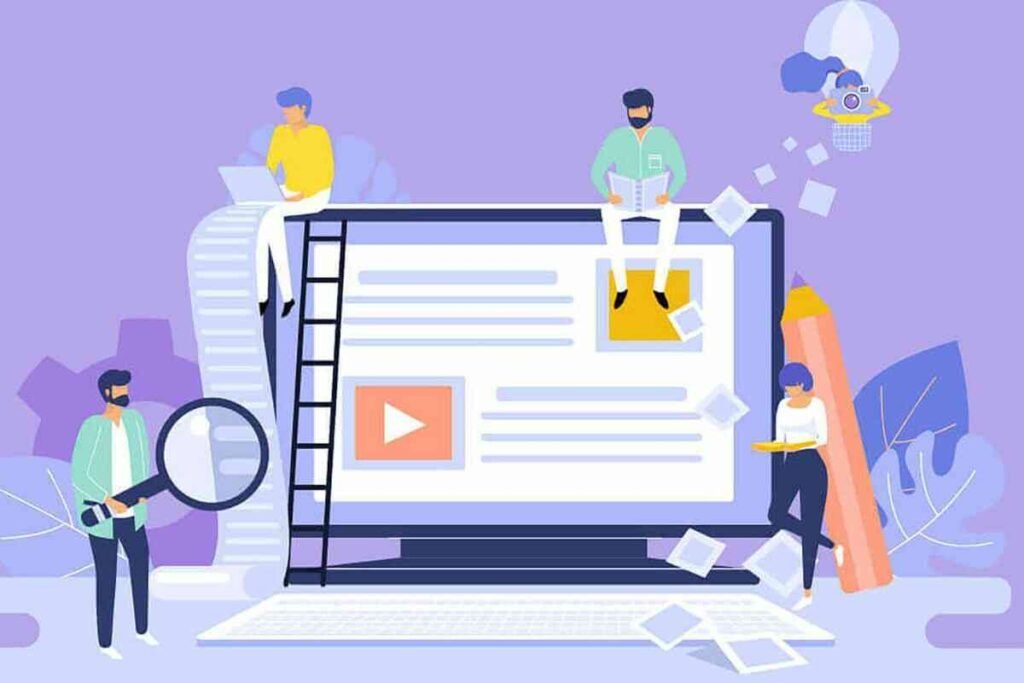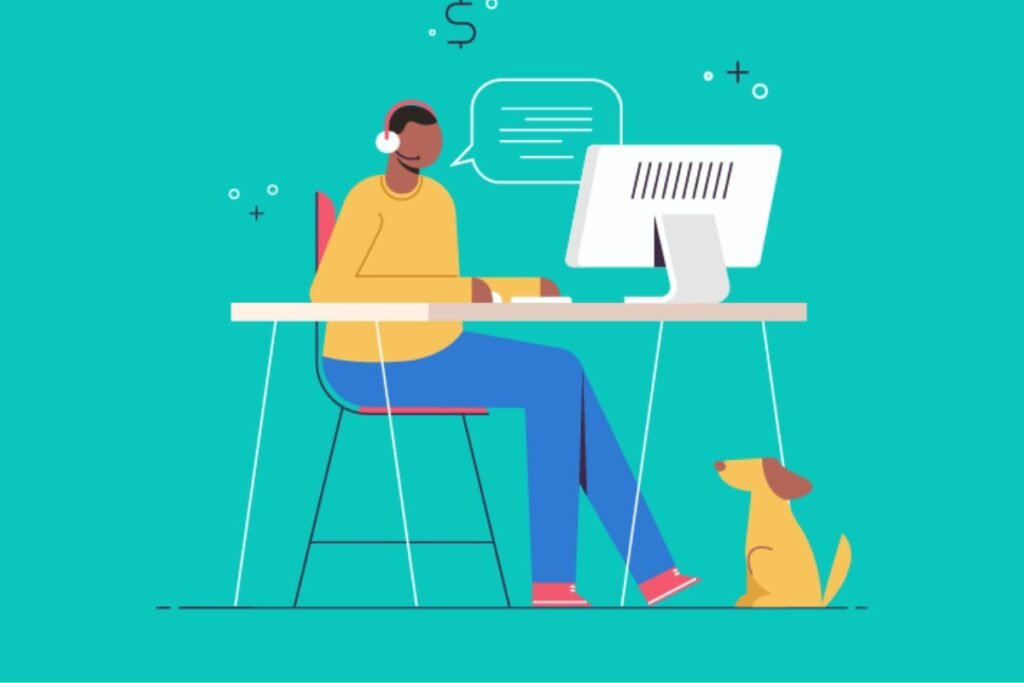I first came across David’s work through his blog Mazepress, and I was hooked. The more I read his posts, the more I realized his advice and insights stemmed from actual experience in the design and marketing space – not just a rehash of the same information available on several other blogs.
Since then, I continue to have great respect for his expertise and we’ve also been in touch over a couple of years.
Apart from being a savvy professional, David is also a great friend and overall human being. Since the beginning of the COVID situation, he has been helping fellow professionals get back on their feet the best he can.
As you can tell, I can’t say enough good things about him. Naturally, it’s a great pleasure that I got to interview him recently and share his valuable insights with you. So let’s begin.
Interview With David Alexander
What is your background, and how did you first get involved in business blogging?
At university I studied digital music and radio production, along with modules in multimedia.
After doing a few dead-end jobs afterwards, I started out online with an eBay business importing hot tubs and swimming pools from China and selling them in Europe. This was in the early days of Alibaba type sites back in 2006.
I also built a website to add credibility as I learned HTML when I was around 13 but had never put it to any practical use.
In 2008, the global economic crisis killed the eBay business overnight as our target audience stopped buying these kinds of luxury goods.
Since I had recently built a website and discovered the potential of the internet as a way to do my own thing, I pivoted to helping struggling businesses to be more effective with their marketing budgets by investing their money in digital transformation, web design and digital marketing.
I have been doing that ever since and documenting what I learn and applying it on niche affiliate websites to test ideas and build semi-passive revenue streams.
I have two core businesses. One is Pixelloop, my digital marketing and web design business and the other is Mazepress. I also have a decent private portfolio of niche websites that I don’t openly share.
How has been the experience with blogging as a way to grow your business? What surprised you the most when you started?
It works! That’s what surprised me. Call me a cynic but growing up in the 90s, I have had my share of pop ups and spammy offers of making riches online which were cheesy as hell and unbelievable.
So I never bit and I was probably right to, but it gave me a bad impression of the world of internet businesses early on and perhaps that’s why I shielded away from doing anything with my skills a decade earlier than I did.
What has been your biggest success/accomplishment in content marketing? Why do you think it was a success?
I don’t know if there’s one single event or success that blew me away. I think my success is more about consistent small wins and being able to help my clients grow over the past 10+ years.
I definitely found building passive revenue streams the most exciting. Nothing gets your day off to a good start like waking up to find you have already made some money in your sleep, even if it’s only 10% of what you need to make that day. It’s reducing the pressure bit by bit.
What are the biggest challenges/failures you faced in business blogging, and how you overcame them?
I think my biggest challenge in the early days was shiny object syndrome and trying to be everything to everyone. It’s far better to find a niche and find tactics that work before trying to test more.
When you are doing everything you can think of you dilute your attention and it becomes extremely difficult to measure the success of individual components of your strategy.
What’s your main content-related business goal for 2021? How do you plan to achieve that goal?
I prefer to just continue building systems rather than setting big goals. I want to continue to grow my reach, readership and revenue and explore more video content.
I plan to work with fewer clients in 2021 as during the pandemic I have been in reactive mode and helping a lot of people, which is great.
I’m grateful for the work in such troubling times for many but I have experienced burnout and I do want to put more time into building the things I love and own.
What would you say is the #1 key to success in business blogging?
Just start! Like the famous subreddit /r/juststart. Don’t over-research and over-plan, it might never happen! Just do!
That experience will be valuable even if you do fail and I think the key to success is failure. I don’t see failure as a negative but a prerequisite for success. It’s important to learn what works but also important to learn what doesn’t.
What do you wish you had known before you started out in this industry? If you were to start all over again, what would you do differently?
I would pick smaller niches and create a website and body of work that’s cohesive and the best content on the topics covered. I would also be less scared of failure. As I mentioned, it can be your friend.
Can you tell me about what a typical day in your job entails? What kinds of decisions do you make in your role?
There is no typical day and that’s the way I like it. The idea of getting up and going through the same processes every day makes my mind numb and is the reason I chose to carve my own path rather than follow the norm.
One day could all be about web design, another I could spend studying, another could be creating content or researching. I try to tackle 4 important things each day and a few minor things.
That’s my productivity plan and I log everything I’m doing each week in Asana because working with a handful of clients and managing several websites of your own takes organisation, but I just like to keep it fresh on a day-to-day basis.
What are your 3 favorite tools/resources when it comes to content marketing/blogging, and why?
WordPress – Because it’s an incredible piece of web tech and I still surprise myself from time to time with what it’s capable of with the right plugins or modifications. It’s a silent sales machine.
Asana – An essential in keeping my mind calm and clutter free knowing I don’t need to stress or worry about forgetting things because Asana is a digital extension of my brain and it’s got a better memory!
SEMRush – It’s just a very accessible SEO and content marketing research platform that allows me to get the best out of my websites.
I know it’s backlink profiles aren’t as deep and accurate as Ahrefs but I like the user experience, the fact I can teach people to use the free version.
Which people, books or blogs have had the most influence on your growth as a blogger/inbound marketer and why?
In the early days of blogging I’d have to give a shoutout to Yaro Starak, one of the rare ones writing honestly on the topic and having great success. Also the 4-hour workweek by Tim Ferris though I’m not sure how relevant it is today.
Since then, I have followed people like Brian Dean of Backlinko, and a recent one is Jimmy Daly from Animalz.
I’d also give a mention to the e-Myth, a book which helped me beyond blogging and content marketing but it definitely had an impact on the way I build systems.
What’s your favorite thing and least favorite thing about content marketing?
I like the variety, creativity and the ability to build something today that will make money tomorrow. Each blog article is potentially a silent sales machine working for you 24/7, even on the holidays.
I’m not sure I have a least favorite thing, maybe the cowboys out there selling snake oil that make people think it’ a get-rich-quick scheme.
What do you think people struggle with the most, mistakes or false assumptions they make when it comes to inbound marketing?
I think people tend to focus on the wrong things. For example, they worry too much on things like design and investing way too much time in the look and feel of their website or blog.
They should rather keep it simple and create amazing content and a streamlined user-experience.
K.I.S.S is a mantra of mine. Keep it Simple Stupid, or Keep it Stupid Simple depending on where you read it.
Design can be the enemy of user-experience, putting more distractions in the way causes paralysis by analysis and can be a massive waste of time and money.
Test the minimum viable product and focus on the thing that moves the needle, creating great content, doing keyword research and competitive analysis.
Where do you live? How’s the marketing community at that location, in terms of social events/meetups?
I’m a bit of a nomad and split my time between the UK, California and a handful of other places.
I’m not a big events person. I go to a few. I’m sure they are amazing for some people, maybe not so much for my introverted personality.
In your opinion, how is blogging changing over the years? Anything that surprised you?
The quality has improved a lot. In the early days really poor websites and articles were gaming the search engines but now search engines are more sentient than ever and able to decipher the B.S.
This is why I don’t recommend trying SEO and digital marketing tricks that sound too good to be true. Because they likely are and the last thing you want is a smack on the bottom from Google!
It takes a lot to surprise me.
If you had to recommend one daily habit to add to your routine in order to become a better business blogger, what would it be?
List out 3 or 4 objectives for the day and no more than that. Ideally do it the day or week before so you can see what the runway looks like.
What do you enjoy doing in your spare time when away from work?
Travel, spending time with my girlfriend, watching football and sushi.


